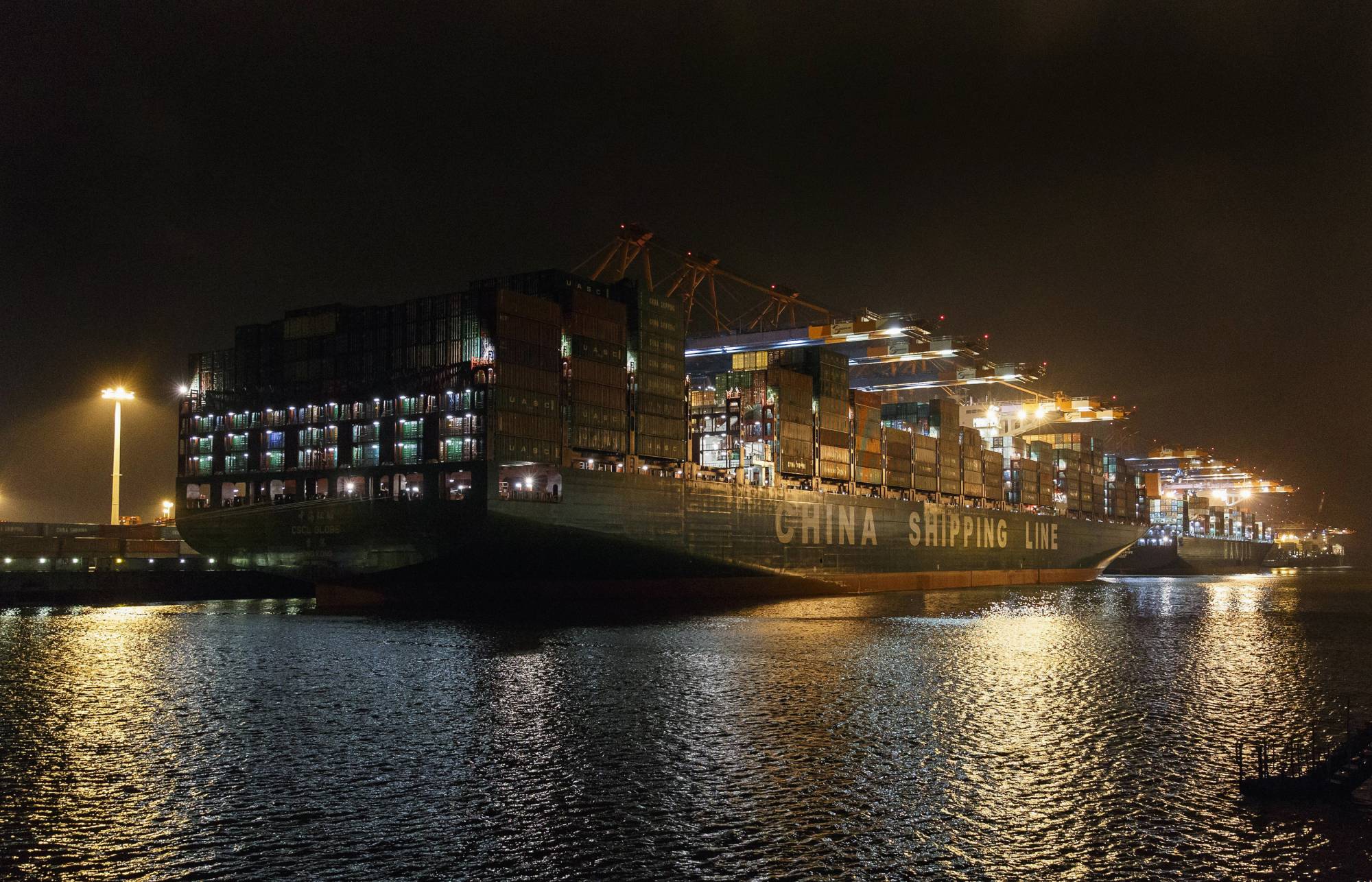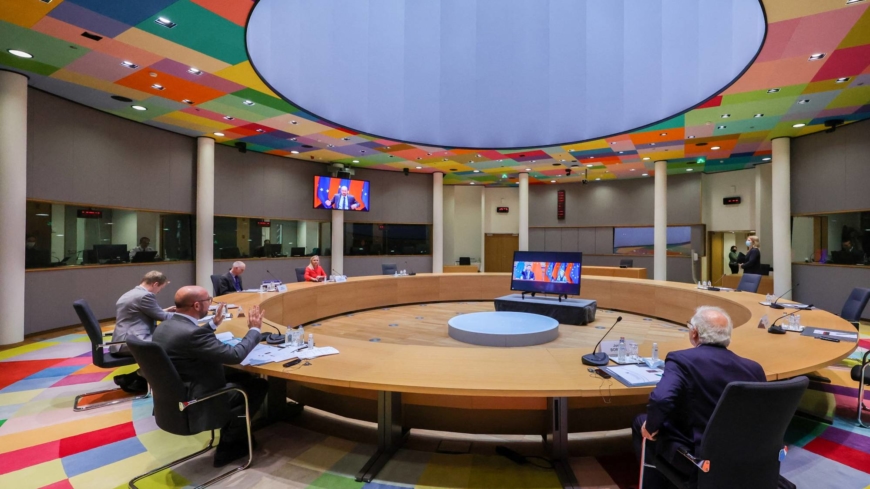It was a top-level summit that was supposed to emphasize the need for cooperation on global challenges.
Instead, the much-anticipated virtual meeting between the leaders of China and the European Union held earlier this month became an exchange of opposing views that highlighted the diverging paths between the two powers.
The topic du jour was Russia’s invasion of Ukraine, with Brussels urging Beijing to take a clear stance on the war, use its “considerable influence” on Moscow to help achieve an immediate cease-fire, and give assurances it would not support Russia militarily nor help it circumvent international sanctions.
“More than 40 countries in total have joined these sanctions. So, we also made very clear that China should, if not support, at least not interfere with our sanctions,” European Commission President Ursula von der Leyen said after the meeting, warning that any move by Beijing to support Moscow militarily would lead to “a major reputational damage for China.”
The EU chief added that such a move could lead to an exodus of international companies from China, as is happening in Russia. “Every day, China and the European Union trade almost €2 billion (about ¥273.5 billion) worth of goods and services. In comparison, trade between China and Russia is only some €330 million per day. So, a prolongation of the war, and the disruptions it brings to the world economy, is therefore in no-one’s interest, certainly not in China’s,” she warned.
‘Deaf ears’
Von der Leyen’s warnings came as a result of Beijing’s recently declared “no-limits” strategic partnership with Moscow and its ambiguous stance on the Russian invasion.
On the one hand, Beijing has expressed concern about the war. China has also been providing humanitarian assistance to Ukraine, promoting direct peace negotiations between Moscow and Kyiv, and reiterating its belief that the sovereignty and territorial integrity of all countries should be safeguarded.

But on the other, Beijing has been forging closer trade, energy, and security ties with Moscow, as the two sides have found themselves increasingly aligned on geopolitical issues in recent years. While Beijing has never expressed support for the war, it has repeatedly called for Russia’s “legitimate” security demands to be “taken seriously and properly addressed” amid NATO’s eastward expansion.
Chinese Premier Li Keqiang told EU leaders at the summit that Beijing would push for peace talks “in its own way,” while President Xi Jinping urged Europe to form its own perception of China and adopt an “independent” China policy — a veiled criticism of the block’s apparent foreign policy alignment with the United States.
The lack of assurances from Beijing on Ukraine resulted in the EU’s foreign policy chief, Josep Borrell, describing the summit as “a dialogue of the deaf.”
“China wanted to set aside our differences on Ukraine – they did not want to talk about Ukraine. They did not want to talk about human rights, and other issues, and instead focus on the positive things. The European side made clear that this ‘compartmentalization’ is not feasible, not acceptable,” he said.
Growing political divide
The divide between Brussels and Beijing, which was widening long before Russia’s invasion of Ukraine, also became apparent when von der Leyen suggested after the summit that little or no progress was made on several bilateral issues.
Key issues included what the EU regards as illegal Chinese trade restrictions imposed on Lithuania after the latter sought closer ties with Taiwan, Chinese sanctions on European Parliament members, EU concerns about human and labor rights in some parts of China, and difficulties faced by European companies in accessing and operating in the Chinese market.
Disagreements on these issues are the latest indication that Sino-EU ties are no longer business as usual. They also point to an increasingly complex relationship that, at least politically, has been in a downward spiral for several years.
One of the key changes in bilateral ties came in March 2019 when Brussels hardened its approach toward Beijing for many of the same reasons the United States did, including some of China’s political and economic policies through the Belt and Road initiative – which also extend into parts of Europe – as well as mounting concerns over Beijing’s trade practices and increased assertiveness in the Asia-Pacific region. This resulted in Brussels referring to China for the first time as not only a partner for cooperation and negotiation, but also an “economic competitor in the pursuit of technological leadership and a systemic rival in promoting alternative models of governance.”
Professor Li Xing, an expert on development and international relations at Aalborg University in Denmark, said Sino-EU ties have deteriorated steadily since the EU suspended its Comprehensive Treaty on Investment with China in May 2021 due to the crackdown on dissent in Hong Kong and alleged human rights violations in Xinjiang. The suspension of the treaty prompted the two sides to impose sanctions on each other.
He is also of the view that the West’s perception of China as a revisionist power — one that is increasingly aligned with Russia — is conditioning European policies on the East Asian country.
China’s perspective
So how does China see its relationship with Europe?
According to Una Bērziņa-Čerenkova, director of the China Studies Center at Riga Stradins University in Latvia, Beijing believes the EU is taking foreign policy cues from Washington.
“China explains this with Europe’s security reliance on Washington within NATO. Beijing likes the idea of European strategic autonomy precisely because this would mean less European dependence on the transatlantic alliance and, subsequently, less criticism and closer ties with China,” Bērziņa-Čerenkova said.

But the reality is not as simple, she said, arguing that Europe’s policies are mainly the result of its own national and regional grievances vis-à-vis Beijing.
Nevertheless, Bērziņa-Čerenkova said that the conversation on European strategic autonomy has been put on the backburner in Brussels since the Russian invasion of Ukraine, with the EU arguing that it is neither the time nor place to move away from its close ties with Washington.
This is why Beijing doesn’t trust that the EU is acting as a fully independent player in important geopolitical issues, Xing noted.
“Chinese elites are convinced that, over the course of the Sino-U.S. rivalry, Brussels will undoubtedly be on Washington’s side,” he said.
As a result of the war in Ukraine, China is now having to face the fact that the conflict is driving European countries closer to Washington and widening the divide between Brussels and Beijing..
Setting a red line
Despite the growing number of issues on which they have opposing views, both China and the EU have so far been unwilling to risk a sharp decline in bilateral ties. Afterall, China is the EU’s largest trading partner.
At the same time China’s appetite for foreign investment and export markets remains high through this economically sluggish period. Beijing, which is making an all-out effort to meet its 5.5% economic growth target this year amid a property market slump and a population decline, is therefore unlikely to further strain ties with Brussels. Both sides have a lot to lose from a breakdown in relations.
But the EU may have also set a red line with its recent warning on Ukraine.
“The future of EU-China relations will be determined to a significant degree by China’s approach to the war in Ukraine,” said Janka Oertel, director of the Asia Program at the European Council of Foreign Relations. “If China openly undermines the sanctions regime that has been imposed, there will be consequences. This could not be clearer now.”
In a time of both misinformation and too much information, quality journalism is more crucial than ever.
By subscribing, you can help us get the story right.


